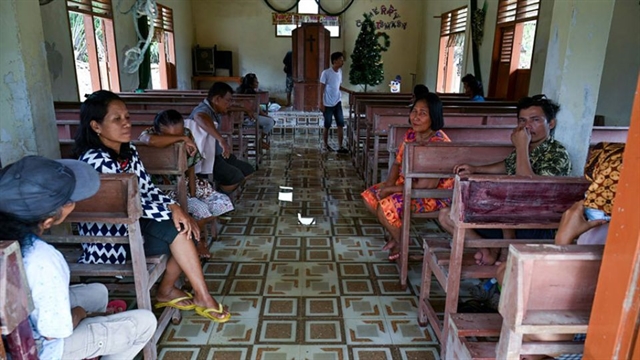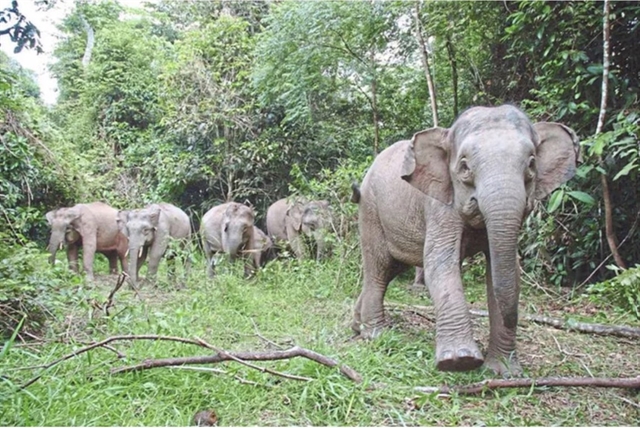 World
World


|
| The Sabah Wildlife Department is working to track down the culprits behind the pygmy elephant killings. THE STAR/ASIA NEWS NETWORK Photo |
KOTA KINABALU — Ivory poachers may be responsible for the recent decapitation of elephants in Sabah, Malaysia.
State Tourism, Culture and Environment Minister Christina Liew said ivory poaching could be the motive, but this could not be confirmed at present.
She was responding to two cases of pygmy elephants that were beheaded in Tawau in 2025.
A third elephant was found beheaded near Ladang Bukit Tukok in Tawau on April 8.
Datuk Seri Liew reiterated that Malaysia does not allow the use of ivory as dowry or any similar practices, and said the ministry will work with the Sabah Wildlife Department (SWD) to track down the culprits.
She added that SWD is strengthening enforcement on the ground by recruiting 300 rangers for patrols.
There are only around 1,500 wild pygmy elephants in Sabah, and this number is dwindling each year.
“This is alarming, and we are doing all we can to protect these wildlife. We do not want them to end up like the Sumatran rhino, which went extinct in 2019 in Malaysia,” Ms Liew added.
Meanwhile, SWD director Mohd Soffian Abu Bakar believes that a trend of ivory poaching has emerged with such incidents.
He said the department received six reports of such incidents since 2024, and all the elephants were killed in the same way.
“Although it is unclear how the elephants were killed, or whether decapitation was the main cause, the rising suspicion is ivory poaching,” he said.
Asked why the animals had to be decapitated, he explained that cutting off the head was faster than removing the tusks from the skull, which could take several hours.
He said there are also suspicions that those who encountered the dead elephants could have harvested the tusks.
Improving care of captive elephants
Sabah has launched the Captive Elephant Management Plan (Cemp) to safeguard one of its most iconic and majestic species, the Bornean pygmy elephant.
Liew said the Cemp would serve as a collective effort in improving the standards of elephant care in Sabah.
“Sabah is home to the smallest elephant in the world, a species found nowhere else on Earth.
“While this unique trait makes them a valuable tourism asset, their existence is increasingly threatened by habitat loss and human-wildlife conflict,” she said when launching the Cemp and the Bornean Elephant Conservation Symposium here on April 9.
“As we gather to discuss and develop strategies for their conservation, we have an opportunity to ensure that future generations will continue to witness these gentle giants roaming our forests,” she added.
Liew said the plan is one of the key outputs of the ongoing Bornean Elephant Action Plan, reinforcing the state’s commitment to ensure best ex-situ practices for elephant management and long-term conservation efforts.
“Our goal is clear – we want our captive facilities, such as the Borneo Elephant Sanctuary and Lok Kawi Wildlife Park, to be recognised internationally as centres of excellence,” she said.
According to Ms Liew, these facilities provide a haven for elephants that cannot be immediately released into the wild while also supporting rehabilitation and eventual reintroduction, particularly at the Bornean Elephant Sanctuary.
They play a vital role in conservation education, research, and sustainable tourism, she said, adding that proper training, resources and recognition for elephant keepers were essential to their work.
Investing in better infrastructure will enhance elephant welfare and elevate the tourism experience, she added.
Liew said a well-managed sanctuary and captive elephant centre would strengthen conservation efforts while boosting Sabah’s tourism appeal, attracting visitors eager to support ethical wildlife conservation.
Although human-animal conflicts continue to occur, she said there are ways to mitigate them and co-exist by considering the tourism, environment and heritage opportunities instead of continuing to regard such efforts as a burden.
She said: “We need to strike a delicate balance that allows for both the welfare of our people in Sabah and the conservation of elephants.
“We must aim for solutions where both communities and elephants benefit. We have seen successful examples of turning environmental challenges into opportunities.”
Liew also noted that community-based conservation, ecotourism initiatives, and compensation schemes would be worth considering.
At the same time, she added that there has to be strengthened enforcement to protect the elephants.
“Poaching and illegal killings must be met with strict prosecution to deter future offences. Snare traps, the ‘silent killer’ of our wildlife, must also be eradicated,” Liew said, urging for increased patrols, active removal of traps and harsher penalties for offenders.
She said: “Only through decisive action and unwavering commitment can we ensure true protection for our wildlife, not just for Bornean elephants.” — THE STAR/ANN





 Brandinfo
Brandinfo